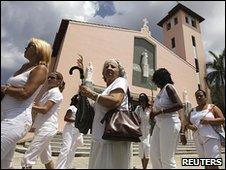Cuba 'moves political prisoners closer to their homes'
- Published

A prisoners' wives group has kept up pressure on the government
Cuba has begun transferring several of the country's 200 political prisoners to jails closer to their homes, according to relatives and campaigners.
Human rights activist Elizardo Sanchez said the relocation of dissidents had begun, while the Archbishop of Havana's office said so far six had been moved.
Officials agreed to relax the prison regime after talks with Church leaders.
There was no immediate official confirmation from the Cuban government.
There has been pressure on the Cuban leadership to improve conditions for political prisoners since the death in February of hunger strike protester Orlando Zapata.
He was the first Cuban activist to starve himself to death in protest in nearly 40 years.
As part of the recent agreement, the government also said it would move sick dissident prisoners to hospital and committed to stop harassing the prisoners wives' group, the Ladies in White, who would be allowed to continue their weekly protest march.
However, the Cuban authorities deny that the men are political prisoners, calling them mercenaries paid by the US to undermine the system.
Amnesty International considers 65 of them to be "prisoners of conscience".
The BBC's Michael Voss in Havana says Mr Sanchez's human rights group, the Cuban Commission on Human Rights and National Reconciliation, is illegal but tolerated by the country's Communist authorities.
Mr Sanchez said the families of four men had been told by the authorities they would be moved to jails closer to home.
Felix Navarro and Antonio Diaz, who were sentenced to 25 and 20 years and jailed in the central province of Ciego de Avila, had been taken to jails in Matanzas and Havana City, he told the AFP news agency.
Diosdado Gonzalez, serving a 20-year sentence, was sent from Pinar del Rio in the west to his home province of Matanzas, Mr Sanchez added.
The archbishop's office also named Jose Luis Garcia, Ivan Adolfo Hernandez and Arnaldo Ramos.
- Published23 May 2010